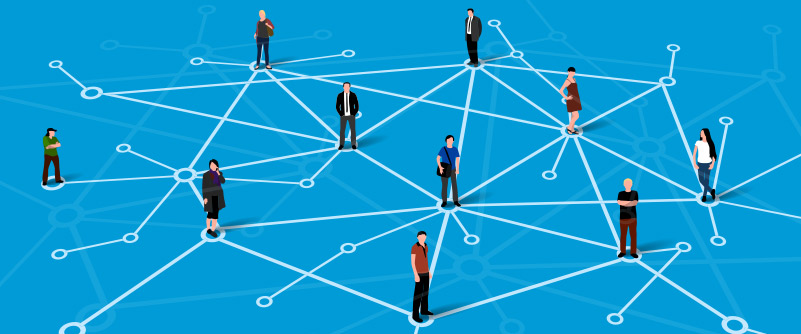How I Won a Pizza Party Through Advocate Marketing

According to CEB global, 57% of the buying process is done before a customer talks to a sales rep. Most of the research done prior to an actual sale is driven by company advocates or loyalists. Relying on “word-of-mouth marketing” and social media, companies can leverage existing customers, industry thought leaders and employees to market on behalf of their company, thus fueling the cycle of “advocate marketing.” Whether researching review sites like Yelp, social media channels such as Facebook or speaking to a colleague, company advocates are either directly or indirectly persuading your prospects.
How do you tap into this valuable resource? This blog will share insights on how to jump start an advocate marketing program …. and possibly win a pizza party in the process.
Who are My Advocates and Where do I Find Them?
To much surprise…. your advocates are actually right in front of you! For every product sold by your sales team, not only were you signing a new customer, you were also signing on a potential new advocate. If your company provides exceptional customer service and a great product naturally your customers will be excited to represent your brand and generate awareness for you.
One of the simplest things a company can do is to work closely with their customer success and account management teams to find out who the happy customers are. Once these customers have been identified it is safe to assume these individuals will most likely become advocates. Additionally, leveraging data such as high Net Promoter Scores (NPS), logged calls including those with your support or customer success teams, and simple data such as which companies have been your customers for the longest duration can also determine those likely to become brand advocates.
How to Run a Successful Advocate Marketing Program
Once you have your advocates, what are the next steps? Advocate marketing programs utilize the concept of gamification to encourage and incentivize your advocates to participate in word-of-mouth marketing. Gamification is the concept of motivating people to achieve their goals through the use of data and game mechanics. Developing a program or leveraging existing software where advocates can enter into challenges in exchange for rewards is the first step in launching advocate marketing.
“Challenges” are activities or tasks that advocates complete within your advocacy program. Here are the different types of challenges that I suggest focusing on:
Brand Awareness: Share marketing content on social media, posting reviews on Yelp, Glassdoor or other review websites, and participating in case studies.
Education: Educate the market on product tips and tricks, product release notes and industry news.
Feedback: Provide direct feedback on feature releases and find out why customers are happy with your product and what separates you from your competitors.
Fun: These types of challenges are created to encourage your advocates to continue to log back into your advocate program. At CAKE, I’ve created fun challenges like a weekly puzzle to solve, an office baby pool for someone expecting or holiday-inspired challenges such as a place to post your Halloween costumes.
Advocates will receive points when they complete challenges. After advocates receive a certain amount of points they are then eligible to exchange those points for rewards. Rewards can range anywhere from company t-shirts and tradeshow passes, to airline tickets and charity donations. Determining the different types of rewards depends on your company culture and your budget. It is important to select rewards that will entice advocates to consistently participate and engage in your program and speak on behalf of your company.
Some challenges are proven to engage advocates more than others. For example, within CAKE’s gamification program, challenges that encourage creativity or provide the opportunity for advocates to offer feedback are typically the ones accessed most often. It is also important to diversify the types of challenges between brand awareness, education, feedback and fun, which keep customers interested and engaged, while boosting your company’s brand.
My Own Personal Experience with Advocate Marketing
Utilizing challenges within our advocate program at CAKE we’ve already seen a number of referrals passed through, an increase in product feedback from clients and an all-time high in social shares from both employees and clients. At CAKE, we implemented a program called Influitive, which makes it simple to run your entire program from a single platform. Leveraging Influitive also provides companies the opportunity to create a client-facing and employee-facing advocate program with separate challenges.
Additionally, your company has the opportunity to allocate a unique name for your advocate program in addition to company branding. At CAKE, we call our advocate program “The CAKE Bakery,” which is a nice spin on our company name. Throughout my experience with Influitive, I have become an advocate for their software and immediately started to engage in their challenges.
Throughout the course of completing Influitive challenges I discovered it has an Advocate of the Month award that they give out based on points that you can accumulate within the Influitive program. I had the opportunity to share tips on how I run my own program for CAKE to other advocates and hear positive feedback from them. I was also able to take some of their ideas and use them in The CAKE Bakery. Ultimately, I completed so many Influitive challenges that I won the Advocate of the Month award and received a pizza party for my entire company.
Advocate marketing is the channel companies should start shifting their focus and marketing dollars to. Referrals and word-of-mouth leads usually have the highest win rate percentage with the fastest sales cycle. These sales leads already know what they want to buy and have most of their questions answered. Why not capitalize on the best performing channel and have fun in the process?